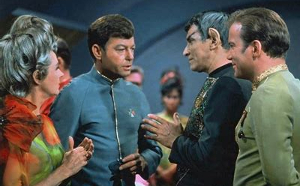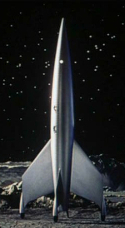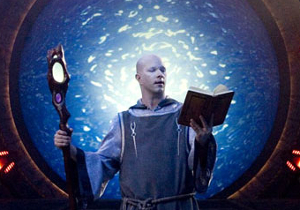Well-Ordered Star Trek
 Of course I like Star Trek. I was only three when it first aired, so I didn't see it until it was in syndication and I was nearly ten; but from early on I was a genuine fan. I knew all the episodes. I built models of the ships. I read (and still possess) the paperback adaptations by James Blish. I even bought fold-out technical plans of the Enterprise.
Of course I like Star Trek. I was only three when it first aired, so I didn't see it until it was in syndication and I was nearly ten; but from early on I was a genuine fan. I knew all the episodes. I built models of the ships. I read (and still possess) the paperback adaptations by James Blish. I even bought fold-out technical plans of the Enterprise.
I was never a Trekkie, however; never deep in the lore.
Revisiting an Old Friend
Wednesday, May 22, 2019 3:45 pm

I was never a Trekkie, however; never deep in the lore.
Long Time Coming
A Lunar Excursion Module is not a rocketship.
An Unexpected Sight
Sunday, April 28, 2019 3:29 pm
 | Rocketships are romance. However grounded they were in speculative engineering, rocketships were ultimately acts of art. They were unreal transports to a heaven closer than God’s. They were graceful. Hopeful. Evocative. |
Religion as Fraud Is Boring
Why Not Try Harder With Your Conflict?
Tuesday, November 20, 2018 3:48 pm
There's a couple of things I dislike about the Ori arc in Stargate SG-1.
 First, it is facile and cowardly to cast Origin, the religion of the evil Ori, as a sort of medieval Christianity. Of course the Ori instigate a crusade against our galaxy. Why not a jihad? Because modeling Origin on Islam and having Stargate Command oppose a jihad would, I suppose, be mean to brown people. Or something. Mustn't be phobic! Except, of course, against Christians. Natch.
First, it is facile and cowardly to cast Origin, the religion of the evil Ori, as a sort of medieval Christianity. Of course the Ori instigate a crusade against our galaxy. Why not a jihad? Because modeling Origin on Islam and having Stargate Command oppose a jihad would, I suppose, be mean to brown people. Or something. Mustn't be phobic! Except, of course, against Christians. Natch.

As the Humans Say
Dialogue for Aliens
Saturday, July 21, 2018 5:28 pm
In The Corbomite Maneuver, an episode from the original Star Trek, an alien named Balok has decided to destroy the Enterprise. Balok then grants the crew some time to make peace with their Deity or deities. And how much time does Balok give the crew? "Ten Earth time periods known as minutes."
No, Not That Kind of Pulp
Here's the Kind I Mean
Tuesday, November 21, 2017 10:53 am
Old pulp has a reputation as vulgar, trashy, lurid, and low; and in their apologetics, the proponents of new pulp are usually quite aware of that reputation.
Sometimes the apology is an outright apology. Some proponents, for example, explicitly disavow the "racism" and "misogyny" of old pulp. Well, okay. I'm not here to hate races or women, either. But declaring against "racism" and "misogyny" is a concession to the very Stalinist conformity that has been destroying our fiction. Those words are no longer reasonable; the enemy has defined them. These days, putting a woman in a dress and saying she is not the same thing as a man is considered "misogyny." Virtue signaling is not the path to better fiction.
Sometimes the apology is an outright apology. Some proponents, for example, explicitly disavow the "racism" and "misogyny" of old pulp. Well, okay. I'm not here to hate races or women, either. But declaring against "racism" and "misogyny" is a concession to the very Stalinist conformity that has been destroying our fiction. Those words are no longer reasonable; the enemy has defined them. These days, putting a woman in a dress and saying she is not the same thing as a man is considered "misogyny." Virtue signaling is not the path to better fiction.
Why the Pulp Attitude Has Attracted Me
On Becoming a Fellow Traveler
Tuesday, September 26, 2017 10:09 am
You can be shaped by what you will not do. I will not drink. I will not curse. I will not lose my temper. Exclude the vices and you become other than vicious.
But “other than” is not enough. The bad is a privation of the good; but the good is not a privation of the bad. You must also be shaped by what you do. Include the virtues and you become virtuous.
We all know science fiction has become vicious. It is a platform for despising God, truth, men, women, and civilization. It gathers the mentally disordered and celebrates their diverse disorders. I just want to read about the defeat of killer robots and instead I must read about six-way sex on the planet Luvwyns.
But “other than” is not enough. The bad is a privation of the good; but the good is not a privation of the bad. You must also be shaped by what you do. Include the virtues and you become virtuous.
We all know science fiction has become vicious. It is a platform for despising God, truth, men, women, and civilization. It gathers the mentally disordered and celebrates their diverse disorders. I just want to read about the defeat of killer robots and instead I must read about six-way sex on the planet Luvwyns.
Flea Markets. In Spaaace!
The Peculiar Novel Quarter Share
Monday, March 13, 2017 1:16 pm
It's been difficult to find a good SF novel. Most, these days, are beset with SJW imbecility. But I keep trying the samples at Amazon. Once in a while a sample is good enough to prompt me to say, "What the heck, I'll finish this one." Quarter Share by Nathan Lowell was my latest choice.
But like pretty much all the books I have obtained hopefully after a decent-enough sample, QS has proven to be...
But like pretty much all the books I have obtained hopefully after a decent-enough sample, QS has proven to be...
© 2004-25 David Skinner · All rights reserved





